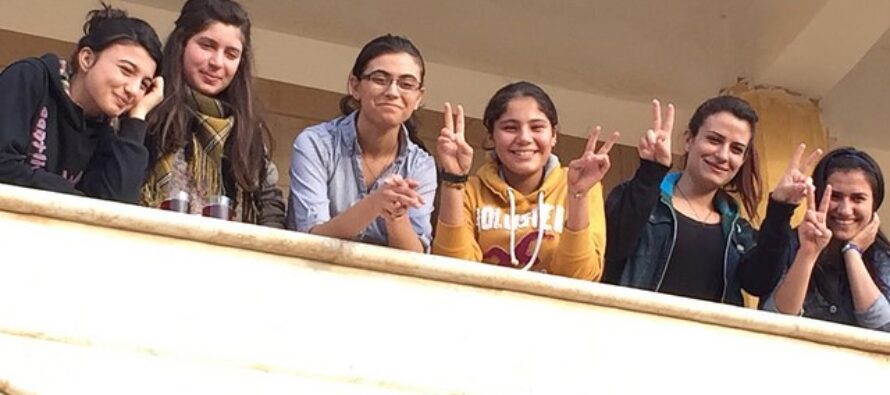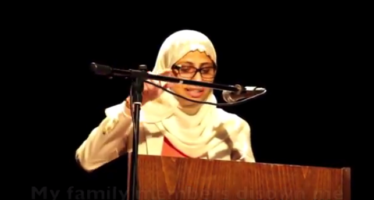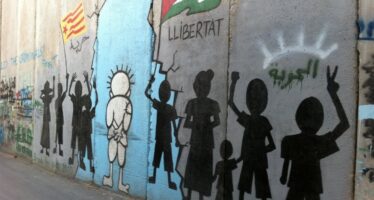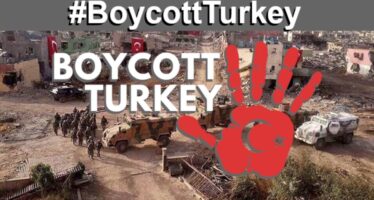The Feminization of Kurdish Politics: A Guerrilla’s Sociological Analysis

![]()
For Kurdish society and Kurdish women, the 40-year-old struggle that has been pioneered by the Kurdish freedom movement and its leadership carries the meaning of a re-birth. Our leader Abdullah Öcalan has referred to this as a “Kurdish renaissance”.
With the emergence of the PKK, people in Kurdistan experienced an awakening to a new day. Cracking through the concrete of their graves, they began weaving a new life. In the forty years that have passed ever since, nothing remained in its old place in Kurdistan. Every aspect of life and its social and political dimensions became subject to fundamental processes of change and transformation.
The Kurds entered the 20th century, an era of the statization of nations and the domination of the world by nation-states, as a people that were denied, divided and rendered without identity and home, facing annihilation from history. Although they possessed all the features that would otherwise qualify them as a nation, to be recognized and accepted as a nation in the hegemonic world system, one had to become a state, which the Kurds did not manage to do. At the time, either nations had states or nations were created for states. In fact, the Kurds participated in the first world war and in the liberation wars after the collapse of the Ottoman Empire as though these were their own wars. Despite playing a crucial role in the liberation and formation of what became the Turkish Republic, the Kurds found themselves in a constant state of revolt and uprising ever since, upon experiencing injustice and denial.
The Kurdish uprisings were met with physical and cultural genocide. While some tribal leaders were executed, others were deported to areas where they did not even speak the language as a policy of forced assimilation and historical annihilation. This lasted in northern Kurdistan until Abdullah Öcalan and his friends launched a new era.
The “war of existence”
The transition period from a Kurdish era before the PKK to one with the PKK brought immense political upheavals with it, which resulted in a great war of legitimate defense. This was a “war to achieve existence”, a war to “re-create oneself”. The oppressive state saw the emergence of the PKK in the same light as all the other Kurdish rebellions of the century and therefore tried to finish it off through repression, violence, and massacre. The PKK held strong ideological-political and intellectual-philosophical principles, however. The reason why a NATO member-state like the colonizer Turkish state has not been able to defeat the PKK despite all kinds of policies of denial and annihilation is related to the PKK’s ideological-political and intellectual-philosophical principles. As solid as this foundation is, it has always allowed itself to be open and flexible to change and transformation, reinforced by an ability to engage in deep criticism and self-criticism. In this sense, for the Kurds, the age of the PKK brought difficult periods of intense war on one hand, and creative and fruitful times of re-asserting one’s existence on the other. Hence, the Kurds managed to enter the 21st century through a process of becoming a “democratic nation”. The fact that they do not have a state does not mean that they cannot constitute a nation. Thus, it is now possible to see the beginning of a process of the dissolution of the nation-state system and its destructive character. While the Kurds’ statelessness is considered a disadvantage from the status-quoist perspective, this condition turns into a favourable one when viewed from the point of the transformative potential of the 21st century. The Kurds established their own democratic autonomous structures through their own struggles and efforts over the years. However, as they entered the new century, the Kurds still lead a great and hard struggle to force the hegemonic international world-system and the states in which the Kurds live to accept their new political gains and positions. This is where the Kurds stand in terms of their political landscape.
The Kurds’ political destiny in the new century
The political system that will characterize the 21st century is yet to be determined. Under the current circumstances, a third world war has been taking shape for a while. In this light, the Kurds’ political destiny in the new century remains open. Nevertheless, we must acknowledge this: the forces that lead the world hegemonic system, which previously divided the Kurds and rendered them without status throughout the 20th century, see and discuss the ways in which the Kurds entered the 21st century as a people, who no longer bow down or heed to oppressors, but instead have been resisting for forty years in the face of all kinds of violence, without hesitating to sacrifice and with a willingness to fight for another forty years, if necessary. Seeing that the Kurds could not be destroyed despite the most horrid kinds of massacres and genocidal policies in the past century, the system is calculating what kind of role the Kurds ought to play in the 21st century. It is clear that these powers have not yet come to an agreement among themselves regarding this issue. However, it was evident that leaving the Kurds without status for another century would even defy the logic of established political science theories, leave alone the ways in which it would disrupt power balances that were envisioned for the 21st century. If we were to express it in only a few words, we can say that the Kurds emancipated themselves from a reality of denial, annihilation and division to a great extent, re-creating themselves in an undeniably strong manner with the leadership role of Abdullah Öcalan and the PKK, and constituting an organized people with the ability to impose their willpower onto the world of the 21st century.
The sociological impacts of the PKK era
One of the greatest changes that the past 40 years of struggle with the leadership of the PKK have evoked is a social transformation parallel to a political one. Before the beginning of the freedom struggle, feudalism penetrated very deeply into Kurdistan’s societal life. Similarly, society was under the influence of unchangeable religious dogmas. Alongside these aspects, society was of course oppressed by colonialist exploitation. The sociological and psychological consequences of this situation were perhaps most dominantly expressed in the formation of femininity and masculinity in Kurdistan. From a social perspective, it is possible to speak of a woman-centrism of the PKK’s Kurdish era. While women are oppressed everywhere around the world, women in Kurdistan and similar places are doubly exploited, constituting the oppressed among the oppressed. Her exploitation and subjugation came not only through the hand of the oppressive state, but furthermore from the very men of her oppressed nation.
The only thing left in the hands of the Kurdish man, who was rendered without state, power, identity, culture, wealth or property, was the woman and the institution of family. His only asset, his only sphere of power and influence was his own miniature state. The colonizer state confined the colonized Kurdish male to this sphere of domination, squeezed him into a tiny state-like institution to find solace in. The Kurdish man’s inability to constitute an organized force of struggle against the hegemonic state and centralist power led him to assert his power in the designated realm of women and family. The reality of Kurdish men was pitiful. Having lost all that he ever had, divorced of his social organization and institutionality, rendered unable to administer his affairs, forced under another’s domination, and at the point of losing even his language and identity, there were two spheres that remained for him to vent: either he would stand up against the colonizer state structures and their power centers, which would require organized resistance, or he would surrender to his subjugation, accept his fate, and continue his physical existence in a state of enslavement. In fact, even the conditions for this no longer existed. Therefore, by denying himself, satisfying himself with other identities than his own, many tried to secure their physical existence. This is one reason why the so-called honor killings increased in those periods in Kurdistan. This lived reality is highly illustrative of the spiritual and psychological situation of the colonized Kurdish man, who bowed down to his fate.
The price of “commodified” womanhood
The social realities of Kurdish women can be best described as the “worst of the worst” conditions. She found herself in a situation of suffering from all sorts of violence of a male reality that had been deprived of everything. She became the victim of a suppressed, brutalized, annihilated man and his violent excess anger. This kind of man, who was not able to do anything other than sit down obediently, his head bowed and hands in his lap, in the face of the state, learned to compensate for his ridiculous state by discharging his anger through abusing women. He stilled his lust for power by constructing his masculinity on the back of the women he domesticated. The woman was thus put in a state of perpetual crisis. As women of an oppressed people without a homeland, they often had no other choice but to surrender to the way things were. During the rebellions, she was merely the woman of the rebelling man, but was not able to gather the consciousness or organized power to come up with a self-determined women’s stance. Whether she accepted it or not, serving men, giving birth to children and raising a family had become her entire purpose in life. Living under the influence of religious, feudal domination, giving birth to many children, especially boys, had become an important criterion for Kurdish women to obtain respect in society. Thus, women in Kurdistan were always seen through the assigned role of birth-giving machines. Since girls were seen as property to be bought and sold, it became more profitable to have male children. With the decisions of their fathers, girls were transferred from their fathers’ property to the assets of their husbands. The men actually put prices on the girls, whom they treated like transactions of property. The bride price therefore presented the financially expressed worth of commodified and objectified woman.
Women constitute the fundamental dynamic of struggle of the PKK
Since its foundation the PKK viewed woman as a fundamental dynamic of struggle and created the conditions for her to participate at the forefront of the struggle. As the struggle obtained an increasingly grassroots character in the 1990s, social transformations of revolutionary quality began to unfold. Kurdish women truly embraced Öcalan and his party wholeheartedly, seeing them as the guarantee for freedom. They saw the movement as a unique platform to render themselves free, beyond the oppressive limitations imposed by family and society. Thus, from the 1990s onward, Kurdish women joined the PKK en masse.
For the first time, the woman openly rejected male domination in Kurdistan. She was leaving all of the traditional sexist social institutions that were built on patriarchal power and thus she was rising up against her fate for thousands of years, facing death along the way. After all, she had nothing to lose but her enslavement. She pointed her weapon at all forms of slavery and domination, overcame fears, and demonstrated the courage to march towards a military, ideological and cultural war. She began to engage in all of the work that was said to be “not women’s work”, “unsuitable for women”, and “impossible for women”. Upon the shooting of the first bullet and facing death, she began embracing the warmth of the utopias in her heart. Each bullet was shot first at her own fears and then at the backwardness that was imposed on her life and being. She learned to fight on all fronts and to create a new life under the siege of death, she did all in her power to enable the possibility of taking a free breath between life and death. In fact, she met with her own power and learned to rely on her own power to stand on her feet. Seeing that all of the “impossibles” that she had been taught were nothing but lies and deceptions, she saw them easily turn into “possibles”, thus overcoming difficulties and adapting to strength. She found answers to the big “what ifs” inside of her by searching and living her own answers. Leaving the state of being someone else’s “property” or “honor”, she was learning to be her “self”. With time, she developed her power to think and exist for herself. It was a remarkable process of “becoming self”. This war of “self-being”, of liberating oneself from internalized dependencies was a difficult struggle. Confronting the difficulty of asserting one’s own self was a rather curious affair, which was accompanied by great and deep spiritual, emotional and mental upheavals. Political, intellectual, emotional revolutions went hand in hand.
Rising from their ashes
With the leadership of women, the realization of the option of a free humanity and a free life became increasingly feasible. The geography of Kurdistan in a way functioned like a big laboratory for women to test all of their “firsts” and to turn them into respective truths. They did not pick and choose ready-made “beauties and truths” for themselves from elsewhere. Rather, they created these values directly through their own experiences. This in turn crucially contributed to their own knowledge. As a result, they came to question the positivist notion of a science that was safe-guarded by a male-dominated mentality. Their experimental investigations objectively concluded with the need to challenge the “great male thinkers” of the world.
Parallel to their own process of reflection and interrogation, women opened the road towards a remarkable qualitative change and transformation process in Kurdish society, as they began to constitute an organized force in the PKK. They questioned and challenged the notions of property and domination that the Kurdish man had long asserted over women. A process of demanding serious accountability from men was initiated. They led serious gender wars and struggles against conservative, backward-minded men, who did not meet their efforts with respect. While combatting backward masculinity, they discussed their own backward traditional traits along the way. As such, they launched a serious war on a thousands of years-old male systems as well as their own slave mentalities, which the patriarchal system had made manifest within the minds, emotions and personalities of women. To the extent to which they struggled against backwardness within themselves and within men, they managed to re-build and re-create themselves based on their own standards for freedom. In the words of our martyred comrade Sema Yüce, “like a phoenix, they re-created themselves from their own ashes”.
As a female co-founder of the PKK, who continued participating in the movement’s struggle until she was brutally assassinated in Paris, comrade Sakine Cansız was one of the dynamics behind the women’s freedom movement’s development based on ideological, philosophical and scientific foundations. Comrade Sakine’s epic resistance against the brutality and infamous torture system during her imprisonment in the aftermath of the 1980 military coup, her upright and willful stance, revealed the spirit of struggle, the potential willpower and the capacity for resistance of women, and generated great confidence in the power of women. The period of the struggles of the people’s uprisings (serhildan in Kurdish) developed in the personage of Berîvan (Bınevş Agal). The deep respect and admiration that the people of Botan felt towards comrade Berivan due to her efforts opened the path to popular revolution. This was a radical intervention in the feudal anxieties of the Botan region vis-à-vis the PKK, especially in terms of their attitudes towards women. Berîvan embodied this changing social attitude in her women’s liberationist personage and activism. This brought forward a patriotic spirit among women, which in turn became a center of gravity for the popularization and socialisation of our movement.
The principles of women’s liberation
Comrade Berîtan (Gülnaz Karataş)’s stance attained the quality and value of a principle for the women’s freedom movement. Her name is associated with the woman’s willful stance against any kind of surrender, betrayal and defeat, a womanhood that does not hand herself in and does not collaborate with the oppressor but resists to death. Our comrade’s principled attitude towards life when she threw herself off the Lelîkan cliffs in order to not fall into the hands of the enemies that besieged her, showed that a person who carries the spirit of freedom within themselves will never be submitted to any foreign entity, that nothing can stand in the way of women’s courage on their walk to a free life. Berîtan came to stand for women’s creation and multiplication of the principles of freedom within her own personality. She became the saying “becoming liberated by fighting, becoming beautiful by liberating oneself, and being loved by becoming beautiful”. Berîtan, became the foundational philosophy of the women’s liberation struggle. Comrade Zeynep Kınacı (Zîlan) became a representation and symbol for the creativity and magnificence of our ongoing struggle. With her incredible action, she blew the minds of both women and men, because she showed that a woman, who otherwise is taught to cling to weakness, in fact carries an immense potential for power within her. Just as in her action, she had expressed her thoughts, experience and deeds in a systematic articulation. We took up her words as a “manifesto”. She came to symbolize women’s love for life by becoming a sacrificial spirit of the women’s liberation struggle. She turned the phenomenon of loving life so much as to be willing to die for it into a philosophy.
Thousands of other sublime women walked the same principled path, who demonstrated their consciousness, faith and stance as revolutionary women. Women like Şilan, Viyan, Arin Mirxan and Rêvan. Women executed in Iranian prisons like Şirin Elemhuli, young Turkish revolutionaries, who go to the mountains like Destan Yörük (Ayse Deniz Karacagil), internationalist freedom-fighters, who struggle alongside all the oppressed like German internationalist Ronahî (Andrea Wolf). The many like Delal, Berçem, Nalin, Gülnaz, Hêlin, Azê, Şevîn, Nujîn, Nûdem, Jinda, Nujiyan, Deniz, Jindar and Medya. These beautiful women and all the other women, who were committed to this life with love and dedication, went down in our history as marvellous individuals, who gave their life on the path to creating the identity of a free woman. Each one of them held the unshakable belief that the women of the world would achieve their identity as free women one day.
The freedom tendencies developing among Kurdish women
The PKK era brought about a great process of change and transformation in all spheres of Kurdistan’s social life, with implications for the development of notions of free women, free men and free society. Today, women’s stance in the Kurdistan freedom struggle and in Kurdish society constitutes an animating and driving force. This driving spirit of struggle developed tendencies in favor of freedom among Kurdish women and found different organizational or institutional forms in different parts of Kurdistan. The source of nourishment for the structures that came to embody this free women’s spirit in Kurdistan and other places where the Kurds live, is our comrade Abdullah Öcalan. With the theses on freedom that he developed, he helped enlighten women’s path to liberation. He enabled women to take ownership of power and the will that can fight against all kinds of difficulty in the struggle. Under major titles like Women’s Liberation Ideology, the Separation Theory, Total Divorce, Free Co-Life and the Project to Transform the Man, his theses on freedom were collectively contributions to help solve the problem of women’s freedom around the world. Especially the idea of “jineolojî” which he proposed as a women’s science is a matter that does not concern only Kurdish women or women in the region, but women around the world.
Within forty years, our freedom struggle reached remarkable levels in the realms of politics, society and women’s liberation. In all aspects, they encompass revolutionary developments. From the reality of a colonized, marginalized society, our 40-year-old, ongoing legacy opened the path towards developing one of the most organized secular, democratic, ecological and women’s liberationist socialities around the world, thereby naturally drawing international attention.
Sadly, our world’s democratic aspects are not very powerful at the moment. Due to their systemless, divided, dispersed and passive stance, existing democratic forces remain weak in the face of the force of capitalist monopolism. They therefore fail to develop their own modernity, their own life systems. Many tasks await the democratic forces of the world to liberate themselves from this situation. Of course, as a movement, we have certain long and middle-term aims in this regard. Above all is our strategy to create the atmosphere and conditions in favour of developing a Democratic Modernity and to ensure the participation of all the peoples of the world in this process. It is indeed possible to induce such a process among the peoples of the Middle East. Against the nation-state monstrosity, we must secure a revival of the ethical and political qualities of our Middle East region, together with the peoples that we co-exist with, to create the conditions and possibilities for the latter to organize and equip themselves to participate in the development of a Middle East Democratic Nations Confederation. This is one of our primary objectives.
Woman’s freedom program
Apart from the long and medium-term goals that our movement envisions, there are further short-term aims of vital importance. Our concrete aims are: destroying the Imrali torture system, putting an end to our leadership’s state of hostage and creating conditions for his freedom, and to build the Kurdistan Democratic Nation or a Democratic Autonomous Kurdistan (neither of them are states) against the monster of the nation state, for the political world of the 21st century to recognize. In the realm of the women’s struggle, we are determined to develop a women’s science and women’s liberation program that will pave the path to freedom for women in the Middle East and around the world. It is of the utmost importance to enable all women with their own perspectives to unite and meet under a common, democratic, liberationist program of struggle.
The 40 years that we have left behind us as the Kurdish era in which the PKK left a great mark, has encompassed important developments concerning the path of freedom for women and peoples. The political, intellectual, philosophical, paradigmatic and programmatic dimensions of this concern the democratic and liberationist destiny of all peoples and women in the region and the world. The future will render this even more urgent. The characteristics of the period we are currently undergoing resemble the periods of the French and Russian Revolutions in many ways. As we know, these processes ended with a 70-year-long era of realsocialism. This time however, actively resisting the shortcomings and fate of realsocialism, it will be possible to build a future around Democratic Socialism.
On our 40th anniversary, we have high expectations that the women of our region will unite with the women of the world and their peoples to follow and support our freedom struggle.
* By Zilar Stêrk Source: Komun Academy for Democratic Modernity
Attribution-NonCommercial-ShareAlike 4.0 International (CC BY–NC-SA 4.0)
Image:
Tev-Cand, Tirbespi
By Janet Biehl
Attribution-ShareAlike 2.0 Generic (CC BY-SA 2.0)
Related Articles
Palestinian Poet Dareen Tatour Sentenced to 5 Months; Create Art To Help Fight Her Conviction
![]()
Dareen Tatour has already spent more than two years and eight months between prison and house arrest for “incitement to violence”
Estados Unidos anuncia que asentamientos israelíes en territorios palestinos no son inconformes al derecho internacional
![]()
Se trata de un notable cambio de posición oficial, siendo el último Presidente de EEUU en hacer semejante afirmación públicamente Ronald Reagan en los años ochenta
Remember, Boycott Turkey, NOW!
![]()
The list of outrages perpetrated by the Turkish republic, under the authoritarian rule of Turkish President Erdoğan in recent years seem endless. The enormous silence surrounding these criminal acts is equally outrageous





